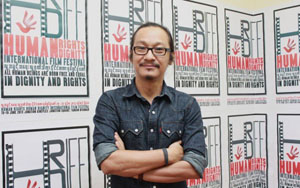Min Htin Ko Ko Gyi had travelled to international film festivals from Korea to Denmark, but it wasn’t until he went to one in neighboring Laos that he realized it might be possible to hold a similar event in Myanmar too.
 “The Laos festival surprised me so much,” says the filmmaker and festival director a few days before the opening of the first Human Rights Human Dignity International Film Festival (HRHDIFF) in Yangon.
“The Laos festival surprised me so much,” says the filmmaker and festival director a few days before the opening of the first Human Rights Human Dignity International Film Festival (HRHDIFF) in Yangon.
“I thought if they could do it, why couldn’t we do it in Burma?”
After returning from many years living in Singapore to his native country, Min Htin Ko Ko Gyi experimented with feature filmmaking, before being inspired by a visit to a village in northern Thailand in 2006 to try his hand at documentaries.
The resulting short film about the ‘human zoo’ of Kayan long necked women being kept there was forbidden from being shown in Myanmar due to its critical subject matter. But it was while he was on his way to research a potential longer film about these women that Min Htin Ko Ko Gyi made a detour to Inle Lake and stumbled across his next documentary idea.
The Floating Tomatoes is about the use of pesticides by farmers around the lake and the destructive effect of chemicals on the environment and people’s livelihoods. The film gained him international esteem and drew him to the film festivals that would inspire him to organize this one.
“As a filmmaker I want to create a kind of democratic space,” says Min Htin Ko Ko Gyi, who has planned the forthcoming event to include debates, workshops for local filmmakers and a special human rights film screening for school children.
“Just screening the films is nothing special,” he says, “but afterwards we will have discussions about the subject matter, including experts the audience and the filmmakers.”
Dedicated to Aung San Suu Kyi (about whom Min Htin Ko Ko Gyi is currently making a film “due to be finished in three or four years”) the festival aims to promote human rights across Myanmar.
Most of the Myanmar films in the festival focus on issues surrounding children’s rights and former political prisoners; while the international films from Brazil to Austria cover subject matter from genocide, to land rights and refugees.
Thanks to funding from the British Council, the festival screenings are free to all and will open in Yangon’s Naypyitaw Cinema on June 15, followed by showings of all 37 films at Junction Square cinema.
The winners in each category –documentary, shorts and animation- will be announced at an awards ceremony attended by Aung San Suu Kyi and Min Ko Naing on June 19 in Yangon’s Traders Hotel. The festival will then embark on a 13-city tour each of Myanmar’s states and division capitals until December.


